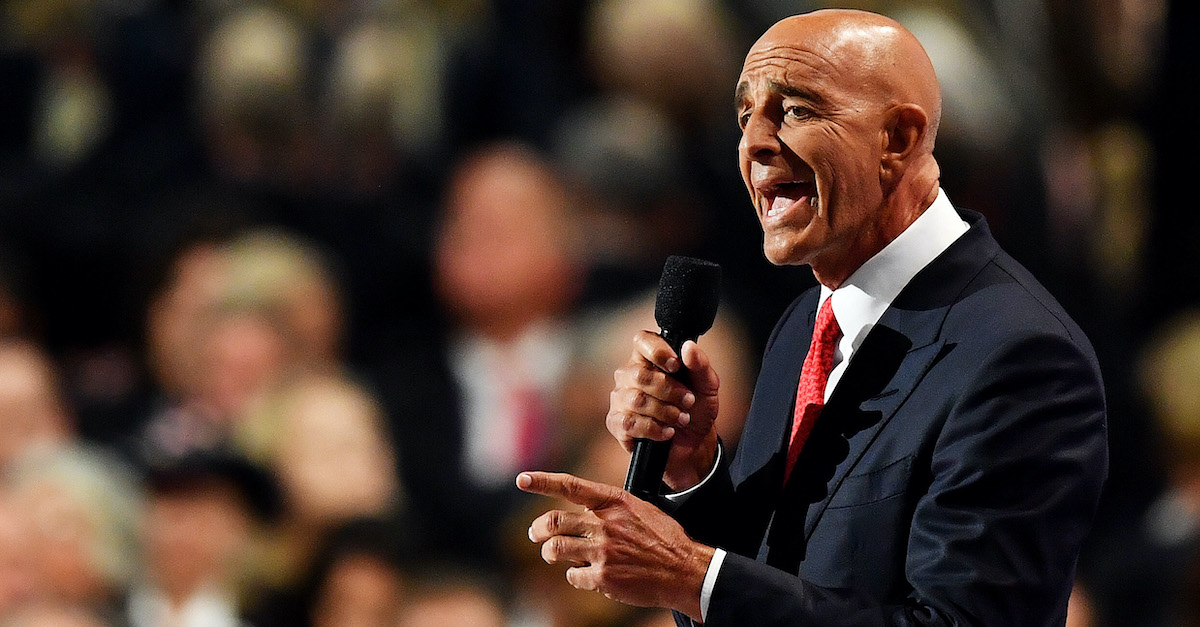
Thomas Barrack speaks at the Republican National Convention.
Billionaire Donald Trump confidant and alleged foreign influence peddler Tom Barrack, 74, was granted a bail package by government prosecutors in a Los Angeles federal court late Friday afternoon.
“He was thinking tonight he might just stay in a hotel,” defense attorney Matt Herrington said as the details were being fine-tuned. “And then he’d be at his Santa Ynez residence tomorrow.”
U.S. Magistrate Judge Patricia Donahue was generally amenable during the long-delayed and ultimately brief hearing as Barrack’s release was previously agreed to by the defense and prosecution.
A representative for pretrial services wanted curfew modifications made but otherwise had no issues or objections to the defendant’s release on a $250 million bond secured by $5 million in cash.
While the headline number of $250 million is necessarily staggering as far as bond goes, for now all the defendant has to pay is the $5 million. So, when will the additional $245 million have to be paid?
“Only if he flees,” CNN senior legal analyst and former federal prosecutor Elie Honig told Law&Crime.
Law&Crime Network host, former prosecutor and current defense attorney Bob Bianchi elaborated.
“The defendant does not come up with all of that money unless the court orders it,” he told Law&Crime in an email. “In other words, the court requires a certain amount of cash, property, etc. to be posted by the defendant. You then go to a bail bondsman, or insurer, and pay a fee, and that company gives the court a bond assuring payment should the defendant not appear in court.”
In the end, the court ordered a bond in the amount of $250 million that was secured by $5 million in cash, which was deposited at the court’s direction. Specifically, the cash is to be held in the trust account of Paul Hastings, LLP, pending further direction from the court.
Herrington noted that the $5 million in cash–which amounts to roughly 0.5-percent of Barrack’s billion-dollar net worth–were already where they needed to be.
Additional conditions were imposed to ensure compliance with the court’s orders and the defendant’s continued appearances in court.
One of those conditions, fairly standard when bail is granted, is that Barrack must surrender his passports. Donahue ordered that surrender to occur by the end of the day on Friday. The defense said that his client’s passports were in the attorney’s possession and would be surrendered to pretrial services as soon as possible.
Several sureties signed up to be on the hook for the balance of the bond should Barrack choose to violate the conditions of his bail.
The defendant’s ex-wife, Rachelle Barrack, agreed to serve as a surety on the appearance bond and was quizzed by the court about her signature on the bond and her intent to voluntarily serve as a surety. Rachelle’s perfunctory affirmations were accepted by the court without fanfare as well as those of the defendant’s son Thomas Barrack III and Colony Capital executive director Jonathan Grunzweig.
The judge noted the defendant also agreed to put up a digital infrastructure company called Digital Bridge and his primary residence–worth some $15 million–as added guarantees that he will comply with the terms of his release. Both of which could be forfeited if Barrack attempts to engineer a Carlos Ghosn-like exit.
The defendant was ordered to remain in the Central District of California until he’s needed for arraignment in the Eastern District of New York and then his travel will be limited to both of those districts and the Southern District of New York. Barrack must appear in a Brooklyn courtroom on Monday at noon. Any other travel plans must be disclosed to the government and court three days in advance.
Pro forma for the charges, Barrack was also ordered not to have any contact with his co-defendant, Matthew Grimes.
One of the stickier points during the hearing was how and when GPS monitoring would be effectuated. Again, this issue was dealt with in fairly typical fashion with no objections from any stakeholder.
The monitoring regime will be imposed at Barrack’s own expense. Specifically the court ordered GPS monitoring with a bracelet to be outfitted by the government. The defendant will also have to observe a curfew and remain home-bound as directed by pretrial services.
Perhaps the most case-specific prohibition here is that Barrack is barred from transferring any funds overseas. He also is not allowed to engage in any domestic financial transfer in excess of $50,000–except for normal and proper attorney’s fees–without the prior and written consent of the government.
Barrack must also comply with COVID-19 guidelines. He was, in boilerplate fashion, ordered to comply with general conditions of release in addition to those conditions which are specific to his case and outlined by the court on Friday. Essentially, this means that he cannot commit any crimes.
“I just express our thanks to pretrial services for nailing that down with the GPS,” Barrack’s defense attorney said as the hearing drew to a close.
The defendant is accused of acting as an unregistered agent for the government of the United Arab Emirates by attempting to press his closeness with former president Trump into real policy wins for the repressive Gulf dictatorship. Additionally, he’s accused of lying to the FBI when questioned about his alleged lobbying work.
[image via Jeff J Mitchell/Getty Images]